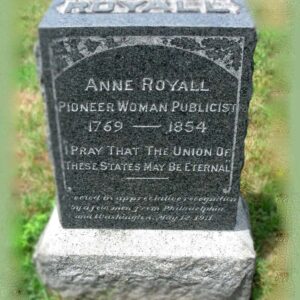
TRUTH TO POWER—AN UNCOMMON JOURNEY
Anne’s early life never foreshadowed the woman she would become. Born in Maryland in 1769, Anne’s family soon moved to western Pennsylvania, living in an eight-by-ten log cabin. Her father passed away and her mother remarried, only to be widowed by an Indian raid in 1782. Eventually, the struggling family moved to Staunton, Virginia to be near relatives. Because of her mother’s skin ailment, they moved to Sweet Springs and she and her mother began working as servants for William Royall, a veteran of the American Revolution.
Mr. Royall took a liking to Anne, who was sixteen at the time, and he arranged for her education as well as offering her the use of his vast library.
The two married in 1797 when Anne was 28 years old. Mr. Royall was in his fifties. Her husband died in 1812, but relatives protested, and in 1823, when the estate was finally adjudicated by the courts, Anne was left without any means of support.
For years, she petitioned for a widow’s pension based on her late husband’s military service. Finally, in 1848, Congress passed legislation allowing her payment. The family intervened, claiming most of her money.
TRUTH TO POWER—LITERARY CAREER
Undeterred, Anne reinvented herself at the age of 57, publishing a series of Black Books in which she provided informative but barbed descriptions of the elite from Maine to Mississippi. Those in power either sought her out or avoided her. President John Quincy Adams called her the “virago errant in enchanted armor.” He invited her to his home to visit his wife and was a subscriber to two of her books.
Anne apparently met and talked with every person who eventually became president, from George Washington to Abraham Lincoln.
TRUTH TO POWER— AN EARLY MUCKRAKER
In 1831, Anne began publishing Paul Pry, a newspaper dedicated to exposing political evil and religious fraud, with the help of orphans. In 1836 she renamed the newspaper, The Huntress.
Among other things, she
- exposed land fraud against Native Americans,
- argued against the divisive tactics of abolitionists even though she was anti-slavery,
- found the sale of alcohol in the Capitol building reprehensible,
- criticized temperance advocates because she objected to zealotry and the interference of the government in people’s lives despite disliking drunkenness, and,
- was a fierce critic of Pastor Ezra Stiles Ely and his American Tract Society. The group tried to forge an alliance between church and state through the election of Christian candidates, and
- complained that the Presbyterians in Washington D.C. were allowed to hold religious services in a public building near her house.
However, she did not support the suffrage movement, preferring instead to champion universal education as a pathway to public participation.
TRUTH TO POWER— CONSEQUENCES
Anne was brutally attacked in New England, horsewhipped in Pittsburg, and chased out of taverns on the Atlantic coast.
Then, in 1829, the local Presbyterians, by her account, began to harass her by throwing stones at her windows and praying silently beneath them as well as visiting in an attempt to convert her. Anne responded by cursing and was arrested, being charged with being a common scold— a woman who disturbs the public peace by noisy and quarrelsome or abusive behavior.
TRUTH TO POWER FINAL THOUGHTS
Anne Royall, the woman who brought the words “redneck” and “the bitter end” into our vocabulary, passed away in 1854. She paid the ultimate price for her refusal to be silenced. How many of us today dare to step up and speak truth to power?
Sign up on www.mariewatts.com to receive future Stories About Life delivered to your email address or read more stories by clicking here.

Recent Comments